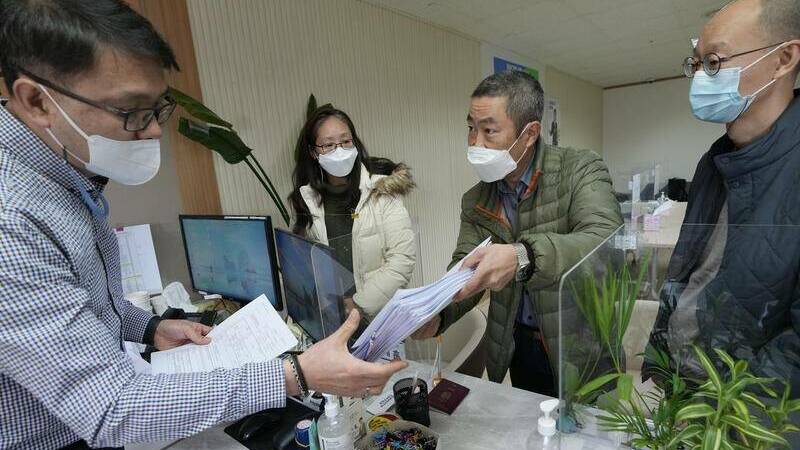
Oliver* wants to know who his parents are, but a sealed file in South Korea stands between him and the truth.
Many Korean adoptees in Australia who have searched to find answers about their adoption have left with suspicions that their adoption records may have been falsified, forged, or entirely fiction.
"We know this for a fact, there is a section in that ... adoption file that is sealed, that we are not allowed to see, not allowed to touch, that has notes from the meeting at the time we were relinquished," Oliver said.
Oliver, from south-west Victoria, is among 370 Korean adoptees from around the world who made submissions to the South Korean Truth and Reconciliation Commission (TRC) to seek an investigation into the nation's intercountry adoption process.
An official investigation would be the first of its kind into Korea's system which is estimated to have adopted out 200,000 individuals since the 1950s.
There were 16 submissions from Korean adoptees from Australia.
"The applications are raising suspicions and concerns and we are just wanting an official investigation outcome to determine if there were wrongdoings or unlawful activities taking place," Oliver said.
Australia has an estimated 3,500 Korean adoptees, like Oliver, many were adopted during the 1980s.
Searching for the truth
Oliver was six months old when he was adopted out of Korea to be raised by his adoptive parents in south-west Victoria.
For most of his life he wasn't interested in finding out his South Korean origins, focusing on blending in to white Australia.
"At the time, like many intercountry adoptees, I kind of almost wished I was white," he said.
In his mid-20s, prompted by a Korean adoptee friend who had made contact with family members, Oliver began to search for his own story.
"The information I've been able to trace so far is that my birth mother fell pregnant and ... ultimately decided that she couldn't raise a child as a single mother, financially or emotionally," Oliver said.
"But that story is a very common one and it's unusually similar to a lot of other cases."
In 2022 Oliver reviewed his file with the adoption agency - Eastern Welfare Society - that handled all Australian adoptions.
However, he was told that a section of his file is off limits.
"I don't know what the truth is right now, I don't know if what's written on my file is the truth or if it's a version of the truth or if it's completely false," the 36-year-old said.
He says that some Korean adoptees who successful reunite with their birth families have discovered an entirely different story to the one they'd grown up believing.
As ACM revealed in April, the reunification process can be lengthy and relies on birth families accepting contact.
Making a submission
In 2022 Oliver chose to make a submission to the TRC which was receiving adoptee applications from countries including Denmark, Sweden and the United States.
His application was successful and he attended an in-person interview with the TRC in Seoul in 2023.
"They seemed to believe that there were some common themes in the early stages of assessments," he said.
Australia and US Korean Rights Group (AUSKRG) advocates for adoptee rights and issued a community statement following the submissions.
One goal AUSKRG want to see from an investigation is the release of "all adoptee's original documents" and "all adoption-related documents, including day-to-day administration" to the central authority.
Oliver expects an official investigation would determine if there were systemic wrongdoings as part of the intercountry adoptee program.
"We don't really know how the [South Korean] government will respond, but we suspect if there was unlawful activity there would have to be some type of repercussion for that," Oliver said.
"We are very much in the truth-finding space."
Prompting an official investigation
Findings are not expected until the TRC wraps up in May 2025.
The 370 adoptee submissions are a fraction of more than 20,000 submissions to the TRC for other investigations into human rights violations in South Korea since the 1950s.
Oliver anticipates that if investigations find unlawful activity, it may prompt similar truth-finding investigations among receiving countries, including Australia, into their processes of taking in Korean adoptees.
"What processes did receiving countries around the world take to check that Korea's adoption program was compliant or safe?" Oliver said.
Australian authorities yet to be contacted
The Australian Department of Social Services (DSS) is the authority responsible for enabling intercountry adoption.
A spokesperson said the department has not been approached by the South Korean TRC's investigators.
"DSS acknowledges the lifelong challenges experienced by intercountry adoptees whose adoptions were impacted by illicit or illegal adoption practices and will be closely monitoring the outcome of the Truth and Reconciliation Commission," a DSS spokesperson said.
"Review of Australia's intercountry adoption partner programs is an ongoing process, involving systematic review of legislation, regulation, policy and practice, incorporating independent validation of in-country adoption practices, and close consultation with state and territory central authorities."
"As the Australian central authority for intercountry adoption, the DSS is responsible for enabling the performance of Australia's responsibilities under the Hague Convention on the Protection of Children and Co-Operation in Respect of Intercountry Adoption."
As ACM revealed in April Korea is not accepting new applications from Australian prospective adoptive parents in 2024.
In Australia intercountry adoption has decreased to 28 adoptions in 2022-23.
*an alias has been used for privacy reasons.
Support is available for those who may be distressed. Phone Lifeline 13 11 14; Intercountry Adoption Support Team 1800 422 377


